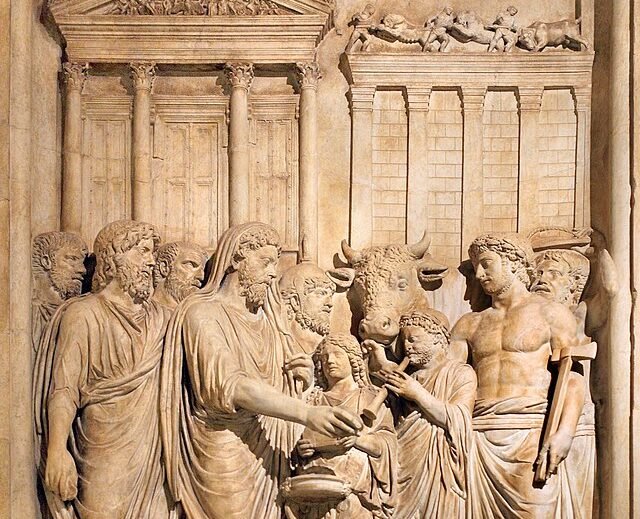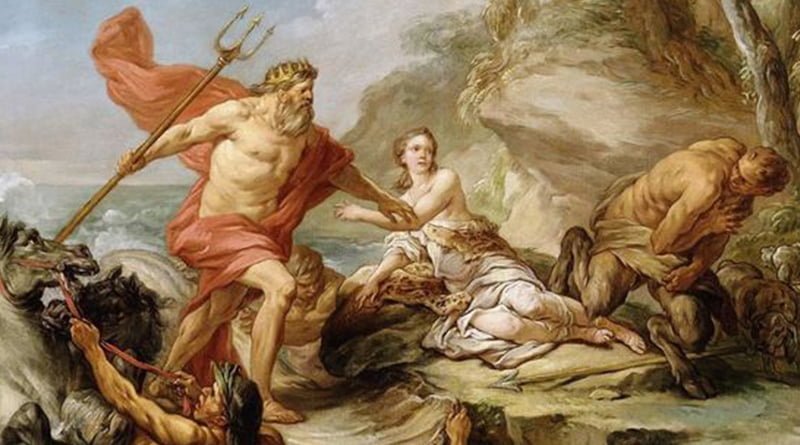Chronos, Kairos and Aion are the three deities of time, events and epic destinies. Here is the multi-religious and multicultural calendar!
Find us on our website Mythology and Legend, on Facebook and on instagram !

The schedule in brief from D-2 to D+5
- 30 June 2024, Daily: Chha
- July 5, 2024, : Poplifugia
- July 6, 2024, : Ludi Apollinares
- July 7, 2024, : Caprotinia
- July 7, 2024, : Ra o te Ui Ariki
The complete interactive calendar
Holidays of the month
July 5, 2024 (1 event)
July 5, 2024

On this day, the Romans celebrated Poplifugium. It celebrated the disappearance of Romulus in a violent storm and taken to heaven while he was inspecting his troops near the Goat Swamp. He would then have become the god of the Romans and their city. #mythology #myth #legend #calendar July #4 #rome #romulus #poplifugium
July 6, 2024 (1 event)
July 6, 2024

On this day and for a week, the Romans celebrated the Apollo games in honor of Apollo. These games were established during the Second Punic War, following the true prophecies of the Sibylline Carmina Marciana books. #mythology #myth #legend #calendar #6July #Apollo
July 7, 2024 (2 events)
July 7, 2024

On this day, the Romans celebrated Juno Caprotina in honor of slave women. The priestesses flogged themselves with their fists or pieces of wood. This commemorates a Roman victory by Camillus over the Latins; according to a minor tradition, a Roman servant or slave dressed as a noble woman and surrendered to the Latins as a hostage; That night she climbed a wild fig tree and gave the Romans a signal by torchlight to attack. #mythology #myth #legend #calendar #July 7 #rome #caprotinia
July 7, 2024

Today in the Cook Islands takes place Ra o te Ui Ariki. This day celebrates the Ariki, the chiefs of the various Vaka of the islands. This is an opportunity to honor the different local cultures and customs. #mythology #myth #legend #calendar #vaka #Ariki
July 8, 2024 (1 event)
–
July 8, 2024
On this day, the Romans celebrated Vitulatio. Macrobius says that it marked a Roman retreat of the Etruscans to Fidenae during the Gallic invasion, and that the Vitulatio commemorated their return victory. The festival was quickly eclipsed by the Ludi Apollinares from July 6 to 13. #mythology #myth #legend #calendar #itulation #Rome #8July
July 11, 2024 (2 events)
July 11, 2024

Today, the peoples of Mongolia celebrate Naadam. During this festival, a competition of archery, wrestling and equestrian sports is disputed between the best athletes of each people. #mythology #myth #legend #calendar #July 11 #mongolia #Naadam
–
July 11, 2024
Today, the Chinese commemorate Zheng He's first voyage on July 11, 1405 with 317 boats. During these seven expeditions, he mapped, put in contact with and traded with all the coasts south of Liuj iagang, up to present-day Indonesia and Somalia. #mythology #myth #legend #calendar #ZhengHe #July 11 #Chine #Ming
July 19, 2024 (1 event)
July 19, 2024

On this day, the Romans celebrated Lucaria. This very ancient festival has origins unknown to the Romans. The woods were celebrated for driving away demons from the trees. #mythology #myth #legend #calendar #19July #21July #lucaria
July 23, 2024 (1 event)
July 23, 2024

On this day, the Romans celebrated the Neptunalia in honor of Neptune. They built arbors of green wood to get shade and they sacrificed a bull. This made it possible to avoid too big a heat wave. #mythology #myth #legend #calendar #July 23 #rome #neptune
July 25, 2024 (1 event)
July 25, 2024

On this day, the Romans celebrated the Furrinalia. The origins of the festival and the goddess were already unclear during the Republic of Rome. #mythology #myth #legend #calendar #25July #rome #furrinalia
Multicultural and multi-religious almanac
An almanac is a calendar showing the main dates of the calendar, the religious holidays, bearing ephemerides such as the phases of the moon or the duration of the days (lunar and solar calendars).
A calendar is a system for marking dates according to time. Such a system was invented by men to divide and organize time over long periods. The observation of the periodic phenomena of the environment in which they lived — such as the daily movement of the shadow, the return of the seasons or the lunar cycle — served as the first references for organizing the agricultural, social and religious life of societies.
The calendar used today in most of the world is the Gregorian calendar. In everyday language, an ephemeris designates what happens daily; the ephemeris of the day is the list of the significant events of this day.